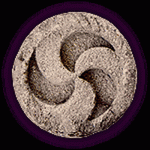Tautalos
Pérégrin


Nombre de messages : 41
Localisation : Portugal
 |  Sujet: RELATIONS BETWEEN HINDUISM AND EUROPEAN PAGANISM Sujet: RELATIONS BETWEEN HINDUISM AND EUROPEAN PAGANISM  Mar 6 Déc - 19:15 Mar 6 Déc - 19:15 | |
| Not that I agree with all, but it is certainly food for thought. For reflexion. http://www.hinduism-today.com/archives/2001/9-10/54-55_pagans.shtml - Citation :
- Pondering Pagans
Belgium scholar cautions Hindus on the West's modern Pagan movement
By Koenraad Elst, Belgium
The late Ram Swarup liked to point out that other cultures had traditions similar to Hinduism before Christianity or Islam wiped them out. He said in The Word as Revelation, "The peoples of Egypt, Persia, Greece, Germany and the Scandinavian countries are no less ancient than the peoples of India; but they lost their Gods, and therefore they lost their sense of historical continuity and identity. What is true of Europe is also true of Africa and South America. The countries of these continents have recently gained political freedom of a sort, but if they wish to rise in a deeper sense, they must recover their soul, their Gods. If there is sufficient aspiration, invoking and soliciting, there is no doubt that even Gods apparently lost could come back again. They are there all the time."
The cultural process of self-rediscovery after centuries of Christianity is already in full swing in many parts of Europe and North America. In Europe, two organizations try to unite the various national groups: the England-based Pagan Federation and the Lithuania-based World Congress of Ethnic Religions. Both have made a brief acquaintance with Hinduism. The Lithuanian group wrote to a 1999 meeting of Hindus in India, "We wish to draw the attention of the Hindu leaders to the efforts currently made to maintain the ancestral religions of the Native Americans, Africans, and other 'Pagan' peoples in the face of the subversion of their cultures and aggression against their dharmic practices by agents of self-righteous missionary religions. We also wish to draw your attention to the efforts to revive or reconstruct the ancestral religions of those nations who were overwhelmed by Christianization or Islamization in the past. By common origin or simply by a common inspiration, these ancient religions share a lot with the Sanatana Dharma, in both its tribal and its Sanskritic manifestations. We therefore wish to express our hope and intention of establishing a friendly cooperation."
At Ram Swarup's suggestion, I have done some participant observation of this spectrum of movements in the last couple of years. I have made many friends in these circles, and I sympathize with the whole idea of the revival of the wrongfully eliminated ancestral religions. Clearly, there is a measure of common ground between Hinduism and Pagan revivalism, both typologically (as non-Abrahamic religions) and strategically. That said, I do have mixed feelings about the actual performance of this fledgling new incarnation of the old religion, which suffers from some serious childhood diseases. In particular, I would like to draw attention at present to a few problems in the encounter and budding cooperation between Hinduism and Pagan revivalism.
Lifestyle: One thing which is bound to strike Hindu newcomers in certain neo-Pagan circles as uncomfortable is the seeming predominance of what Indians know all too well as hippyism: the kind of loose and undisciplined behavior which Western rucksack travellers have displayed while sojourning in India.
The fact is that the looser morality which Asians tend to identify as typically modern-Western is entirely the norm in most neo-Pagan circles. The Pagan author Fred Lamond candidly admitted, "Our practical ethics are 90% the same [as those of established religions, but] the only area where our principles differ sharply from theirs is in sexual ethics. To Pagans, sexual intimacy before marriage is neither sinful nor immoral."
Hindus in India, and perhaps even more so the overseas Hindus who have experienced a close-knit family structure and the concomitant "family values" as a great asset in their professional success, would probably feel closer to the prudish morality of Christian evangelicals than to the libertine neo-Pagans.
Other Hindu taboos, as on beef-eating or meat-eating in general, are equally foreign to Western neo-Pagans. Though vegetarianism is a major trend in some circles, others celebrate hunting and do-it-yourself slaughtering of your next meal as part of the return to a more natural way of life. Even among the vegetarians, the motive is more often health and ecology rather than Hindu considerations such as compassion for all sentient beings and the taboo on touching, let alone digesting, animal tissue in a state of decomposition.
Yoga: One of the most important fruits of civilization is a system of techniques allowing man to reach beyond the ordinary, world-absorbed consciousness. This does create an inequality within the broad category of non-Abrahamic or "Pagan" religions. I am aware that this is bound to put some readers off as being elitist, but there is a real difference between the systematically developed techniques of consciousness as practiced in Hindu and Buddhist monasteries (and by laymen every morning and evening), on the one hand, and the whole spectrum of ordinary religious experience on the other: ritual, celebration, devotional practices, even erratic mystical experiences that anyone may have in exceptional moments. The best way to realize this difference is to meet an accomplished yogi. The quality of profound peace he radiates is unlike anything else. This does not mean that other activities, religious and secular, are somehow bad and to be shunned. Not at all. Whereas Western adepts of yoga often deride "organized religion" with its rituals, I have never heard of an Indian or East-Asian practitioner who did not observe some calendar of rituals (e.g., Zen as a tradition of meditation is heavily ritualized). Contrary to what early Orientalists imagined, 99% of the people in the Orient are not sages; yet, they are aware of the existence and nearness of such a class of seers, and this infuses their religion with a quality absent in the purely naturalistic Pagan religions.
Did such a spiritual tradition exist within the pre-Christian religions of Europe? In Greek and Hellenistic culture, we certainly see traces of it, but they are usually attributed to Egyptian or Asian influence. A perusal of the remaining (and often distorted) Pagan literature of the Celts and also of the Germanic peoples shows a lot of celebration of life, of courage and passion, and some insightful meditations on the mysteries of life and death, but nothing like a yogic tradition. Neo-Pagans who understand that something is missing make up for it by borrowing heavily from the living traditions of Asia. Thus, neo-Druids such as the "Order of Bards, Ovates and Druids" have imported a lot of Hindu-Buddhist lore into their curriculum as a substitute for the unknown and irretrievable doctrines which the ancient Druids must have taught. To some extent, this is historically justified because European and Asian Pagan traditions did have certain doctrines in common. For example, the belief in reincarnation is well-attested by Greco-Roman observers of the Druidic tradition, in Virgil's Aeneid and other European Pagan sources. But to some extent, it may be just fantasy. It is really possible that our Celtic and Germanic ancestors did miss out on some philosophical developments which were taking place in more civilized parts of the ancient world. And whatever they did know and teach has largely been lost, or only been registered by Christian monks who didn't understand much of it anymore. So, either way, neo-Pagans trying to supply the innermost teachings to a tradition of which folklore and scanty surviving texts have only preserved a skeleton, have no choice but to look to surviving traditions like Hinduism.
Polytheism: To many Western neo-Pagans, this is the central point of difference with the Abrahamic religions, and so they brandish their polytheism as the defining trait of their religion. Thus, the Belgian periodical Antaios calls itself a medium for "polytheist studies." While most Hindus have no problem with polytheism, they will find the issue in itself less important. Depending how you define "God," something can be said for both monotheism and polytheism. The ancient Greek philosophers, though undoubtedly Pagan, nonetheless sought a unifying principle underlying the whole of creation. It is only because of the Judeo-Christo-Islamic crusade against polytheism that this has become such a crucial issue for Westerners trying to revive their Pagan roots. As Ram Swarup puts it: "A purely monotheistic unity fails to represent the living unity of the Spirit and expresses merely the intellect's love of the uniform and the general. Similarly, purely polytheistic Gods without any principle of unity amongst them lose their inner coherence. The Vedic approach is probably the best. It gives unity without sacrificing diversity."
I feel that Hindus should welcome the revival of the pre-Christian religions of the West, often cognate religions through the common Indo-European origins, otherwise at least typologically related religions which are not based on a monopolistic prophet or scripture. At the same time, they should be watchful for impure motives and degenerative trends, or for phenomena which may be acceptable in a multicultural framework but with which they need not involve themselves. The ancestral religions of Europe are at present in a formative stage, a stage of groping in the dark, of gradual rediscovery or self-reconstitution. At this stage they attract people with a variety of motives and divergent levels of knowledge and understanding. Still immature, these religions often look to Hinduism for guidance.
Dr. Koenraad Elst, 42, studied philosophy, Sinology and Indology in Leuven, Belgium and Varanasi, India. His book "Decolonizing the Hindu Mind" has topped the Asian Age magazine's non-fiction list for May, 2001.
Koenraad Elst, P.O. Box 103, 2000 Leuven 3, Belgium
email: koenraad.elst@pandora.be | |
|
Ferrier
Administrateur


 Nombre de messages : 18530 Nombre de messages : 18530
Localisation : Europe-Nation
 |  Sujet: Re: RELATIONS BETWEEN HINDUISM AND EUROPEAN PAGANISM Sujet: Re: RELATIONS BETWEEN HINDUISM AND EUROPEAN PAGANISM  Mar 6 Déc - 19:26 Mar 6 Déc - 19:26 | |
| Thank you for posting. I have modified the typology of your text.  Indeed, I do not agree with the example of an hinduism mixed between polytheism and monotheism. The vedic paganism was clearly polytheistic but new philosophies have created a sort of monotheism, the cult of Hari Hari, a mixing between Visnu and Siva, for example, or the terme Ishvara, "Lord", to call one of these both deities. A vedic polytheistic renaissance in Hindutva would be a good thing. | |
|
